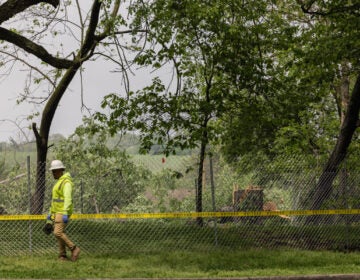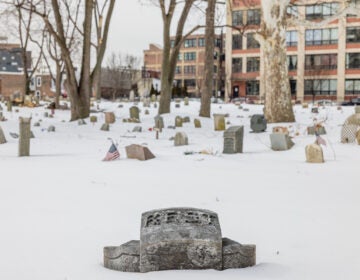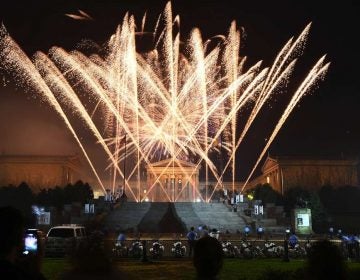Lutheran Theological Seminary at Philadelphia bridges sacred and secular living
The Lutheran Theological Seminary at Philadelphia (LTSP) has become a nexus for clergy and laity alike. Though it is not a public church in the “traditional sense,” Director of Communications Merri Brown emphasized that the faithful are always welcome.
“While there’s no formal congregation, we have plenty of prayer services during the day,” Brown explained.
In addition to the seminary’s strictly faith-based functions, Brown noted the seminary maintains a number of facilities open for public use, referring to it as the “town hall” of Mt. Airy. Among these are the William Allen Plaza, an outdoor courtyard dedicated in 2009 to William Allen, whose summer home gave its name to the Mt. Airy neighborhood. Brown said the institute holds a farmers’ market in the area during the warmer months.
The seminary’s Brossman Center also serves as a multifunction venue for public and private events. Brown said the Center allows the seminary to serve the public in different capacities by providing accessible public space.
“We’re contributing to a community of believers,” Brown said. She added that having a place to gather and communicate freely was vital in fostering that solidarity.
Beyond its function as a meeting place, the seminary’s 350 to 400 students frequently interact with members of the community as part of their education. “Field education,” Brown explained, “is an important element of our students’ contextual education. “They need and want to be in the trenches,” she said.
Students’ involvement with different members or sections of the local community draws heavily upon individual areas of academic concentration.
According to its website, LTSP offers six degree programs – four master programs and two doctorate programs. It also offers a number of online courses in cooperation with Lancaster Theological Seminary. In 2009, LTSP began offering its newest concentration, the master of arts in public leadership in conjunction with Temple University’s Fox School of Business and the Temple School of Social Service.
The Rev. Louise Johnson, the seminary’s director of admissions, explained in the spring 2009 issue of LTSP’s semesterly Philadelphia Seminary publication that the degree program intentionally “blurs the lines between church and world,” enabling students to embrace the intersections of theology and other concentrations.
“Our hope,” Johnson wrote, “is to train leaders who will be in church buildings, yes, but also in office buildings. Our hope is to train leaders who are conversant in the languages of business and theology and savvy about how to weave theological and biblical principles into the world’s economic, political and social fabric.”
Dr. Jon Pahl, who is both LTSP’s director of master of arts programs and current professor of History of Christianity in North America, said the program “challenged the dichotomy between the sacred and secular.”
Pahl, who contributed heavily to MAPL’s establishment, said it is too often that religious and nonreligious professions are placed in black and white categories. “MAPL exists to develop a spectrum of grey,” Pahl said. “It exists to blend the black and the white. The blending – that’s what it’s about.”
Pahl said he is working to include that same blend of sacred and secular in more of his engagements with the church. This past weekend, he and a number of students held a vespers service and fundraiser set to the music of composer and performer Duke Ellington. Though the selections of Ellington’s music the group used did not contain any religious overtones, Pahl explained he felt a spiritual depth in the music worth celebrating.
Pahl said using Ellington’s music allowed him and his fellow musicians to “raise the consciousness” of attendees about the meeting of the religious and the worldly. “It allowed us to reiterate that these things aren’t as far apart as we sometimes like to think,” he said.
Rodney Smith, a drummer and student at the seminary, agreed with Pahl. “When you reflect on Ellington’s music, there’s an appreciation to be had there. His music has a spirituality to it, but it’s not religious,” Smith said.
Pahl said he felt the discussion of sacred and secular was also important as an examination of differences. “There’s a dignity of difference,” he explained. “The things that make us individuals can make us stronger as a whole, as a society.”
Pahl said he’d be interested in holding another, similar event in the future, focusing on a different composer or musician. Donations from the recent service and fundraiser were split between the MAPL program and Lutheran Settlement House, a local non-profit organization serving vulnerable adults and children.
Founded in 1864, the Lutheran Theological Seminary at Philadelphia moved to its current location in 1888. LTSP is home to the nation’s first Lutheran graduate school, which was established in 1913 and was one of the first Lutheran schools accredited by the American Association of Theological Schools. It is located at 7301 Germantown Ave.
WHYY is your source for fact-based, in-depth journalism and information. As a nonprofit organization, we rely on financial support from readers like you. Please give today.




